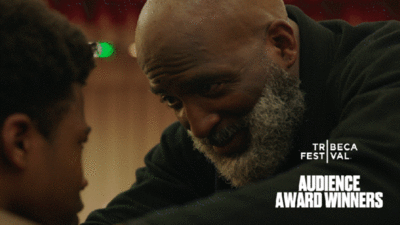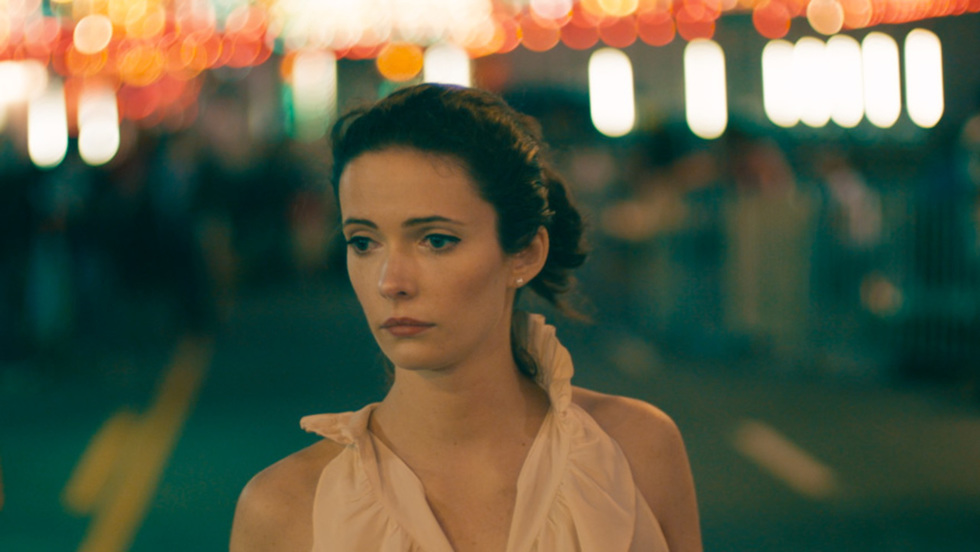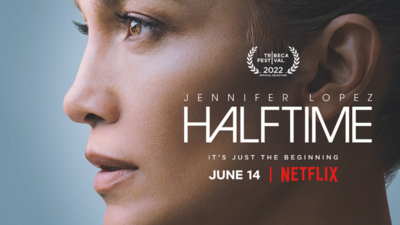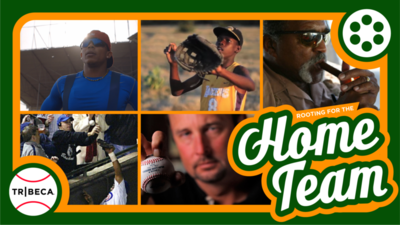
BY KRISTIN MC CRACKEN |
Camelot? It's Not.
In Caroline and Jackie, Adam Christian Clark—in his feature debut—tells a tale of two sisters. To give away any more would ruin the surprise.

Tribeca: Congratulations on your first feature, Caroline and Jackie. It has so many twists and turns—well done! So how would you describe the film in your own words?
Adam Christian Clark: Caroline and Jackie follows the convention of an American indie drama, and while there certainly are thriller aspects to it, genre-wise I'd call it a character-based drama. It's family-based, but it's certainly not a family drama. [laughs]
Tribeca: As the writer/director, what inspired you to tell this story? And the names are certainly quite evocative of the Kennedys: Caroline and Jackie…
Adam Christian Clark: In the script, the last name the two sisters share is "Wright." I was trying to make a film about women who grew up with the pressure of always trying to be on point—there's an extreme pressure that they obviously came out of, but are still living with in their life. They're always dealing with presenting a certain image to other people. So with "Caroline" and "Jackie," my intention isn't for people to see it and think they're seeing a movie about the Kennedys, but I think with those two names, they evoke a certain emotion, expectation or feeling that is indicative of the issues these characters are dealing with.
Tribeca: So what inspired you to tell this story? Where did it come from?
Adam Christian Clark: I think I have a very complex family—a lot of us do. I've always been really fascinated with how sometimes our family members will be the meanest people to us, but we still love them. And we'll be just as close or even closer to them when they're the meanest; there seems to be this inalienable bond that never seems to go away. Even if somebody loves or hates their parents or their siblings, they'll still have this fear of having an unreconciled incident on their deathbed.
I think there was no better way to explore the bond of family than with sisters; they are certainly a little more emotional than men. I'm not a sister, obviously, but I wanted to explore that relationship.
Tribeca: This was your first feature—how did you work with the actors? Was there room for improvisation in the process?
Adam Christian Clark: This film was highly improvised. I should clarify that—because it's not improvised in the Mike Leigh or Curb Your Enthusiasm sense, where everybody just goes and does their own thing—because it's not comedy. But this script was less of a traditional script and more of a 60-page, script-form outline. So every question and every answer was in the script, but the exact phrasing wasn't.
We did a month of rehearsal, and it was a very intensive daily process. I started with two characters on their own. For instance, Jackie and Ryan—the boyfriend and girlfriend characters—I had them go out on dates, and I had them really establish a separate relationship. And at the same time, I'd do it separately with Jackie and Caroline, or I'd do it with the Charlie and Michelle characters.
Once I'd established that in the first week, in the second week I paired the pairs together into groups. And then coming into the third week, the fourth week, we would just methodically go through these scenes, over and over and over again. We must have rehearsed the intervention scene 20 times around my dining room table—to the point that when we did get to filming, even though it was still improvised, everybody pretty much knew their exact lines within slight variations.

Tribeca: That's really interesting. Did you know this is how you were going to do it? How'd you come up with this idea?
Adam Christian Clark: I have a lot of experience with reality TV—I worked on Big Brother for a few years. When I started in reality TV, it was still a novelty, and it was something I never thought would last. In hindsight, I have a tremendous amount of respect for them, but at the time I didn't; I never wanted to become a filmmaker to make reality TV shows—I just wanted to make art house features.
As I attempted to do that in my first shorts, I really fought against the experience I'd had, and I went about it in a more Stanley Kubrick-like way. I was doing everything I thought I needed to do make movies like the ones I liked: very formalistic dolly shots, and everything was like, "You must hit this mark right here." And as I did that, I fell on my face a couple of times. I felt like I wasn't utilizing a lot of skills I had, and I also wasn't really focusing on the quality of the acting as much.
So in doing this film, I really put all focus on the acting, to the extent where I would do these rehearsals and try to create an environment where [the actors] were really supported, and they were always the priority. I think I was effective, and I enjoyed this process more so than anything in the past.
Tribeca: What's the biggest lesson you took from directing your first feature? What advice do you have for people looking to make that switch, from shorts to features?
Adam Christian Clark: I think it’s hard for me to say what the lesson I took out of this was until I make the next thing. But I can say why I think a lot of lessons I learned before this helped me on Caroline and Jackie. The biggest lesson was learning to take my own ego out of the project—to make sure there was never any aspect of the film that was about me. My intention was always to promote the strengths of the key people I was working with—making sure that the camera work never outshined the story. Some of the prettiest shots are on the cutting room floor, and some of the strongest solo performances aren't in the film because they took too much notice of themselves.
So for me, in this specific filmmaking style, I think my lesson was to make sure that everybody was always working as a group. That we were all part of this thing that was bigger than us. But that's not always applicable. There are some really great movies that aren't this style, that aren't something I'll probably ever make—movies that are the exact opposite, but that I love anyway.
Tribeca: Right. You're not going to make David Lean movies.
Adam Christian Clark: Right. Or even—21 Jump Street was such a great movie; I loved it—but this style of filmmaking would not work in 21 Jump Street, you know?
Also, we shot this pretty much in chronological order, with a few exceptions where we couldn't, because of daytime/nighttime stuff, but mostly it was shot in chronological order.
Tribeca: Wow, that's a luxury.
Adam Christian Clark: It is a luxury, but it's also a choice. We shot this in 14 days, which is very short for a feature film. So we shot the intervention very early on—maybe the second or third day—and I'd say watching that was a moment when I realized there was a potential for the movie not to be bad [laughs], so I better make sure that the next 12 days worked out.
What's weird about a film is that there are so many elements that are important, so that even if one goes bad, then the whole thing's bad. If your script's not good, if the acting's not good, then the move's not good. It just has to all really come together.

Tribeca: What do you hope audiences at Tribeca take away from the film? What do you hope happens at your screenings?
Adam Christian Clark: It would be a tremendous success for me if everybody in the audience, just for even a brief moment, even just for 10 seconds, forgot they were watching a movie and just thought they were watching their own family or a family they've been with.
Tribeca: What are you most looking forward to at your film debut at Tribeca?
Adam Christian Clark: There are some other filmmakers that I've admired for a long time that are in the same section (Viewpoints) I’m in, and it’s a compliment to be showing my film alongside theirs. I'm excited about Tribeca—I think the programmers right now have a taste that aligns with what I think is good, and I feel honored to be showing there. It validates my insecurities in a certain sense… though I'm sure they'll never really go away.
Tribeca: If you could have dinner with any filmmaker alive or dead, whom would you choose?
Adam Christian Clark: I saw Sofia Coppola about six months ago in the lounge at LAX, and I've never been starstruck, ever, but… So I went up to her, and she was very graceful and she did talk to me for a while. But I really couldn't communicate at all—I was like a little boy, and I couldn't get my words out. I'd love to have dinner with her to have a second chance.
And I know she's not a filmmaker, but I'd love to have dinner with Gena Rowlands, because she's my favorite living actress and her husband is one of my favorite filmmakers of all time. I think that'd be amazing.
Tribeca: What's your favorite New York movie?
Adam Christian Clark: Rosemary's Baby is probably my favorite movie of all time. I've loved it since I was a teenager, and it was a major motivation for me getting into film in the first place. It was shot by Billy Fraker (William A. Fraker, A.S.C.), who coincidentally ended up being a professor of mine in my sophomore year of college. Having this happen kind of blew my mind, and I sort of refused to leave Billy's side from the moment I met him. Billy was one of kindest people in the world; he ended up being my longtime mentor, and one of my best friends. He really believed in me in such a kind and sincere way before I had yet found any value in myself; he was like a father to me.
I bring this all up because unfortunately he passed away right before we finished Caroline and Jackie, and the film is dedicated to him. It's sad for me, because I wanted him to see it more than anyone else.
Tribeca: What a great story. What would your biopic be called?
Adam Christian Clark: Oh wow. My biopic would be called When I Get There, I'll Be Happy. Because I feel like the thing with filmmaking, or why I like it, is that it's just always unachievable, and something you get better at. It gives you a reason to wake up in the morning, because there's always a way to be better.

Adam Christian Clark started directing the TV show Big Brother while at USC film school. He worked as a roster director at Quentin Tarantino's A Band Apart production company and later wrote and directed China's first reality TV series. His short film work includes The Editor and the award-winning Goodbye Shanghai.

